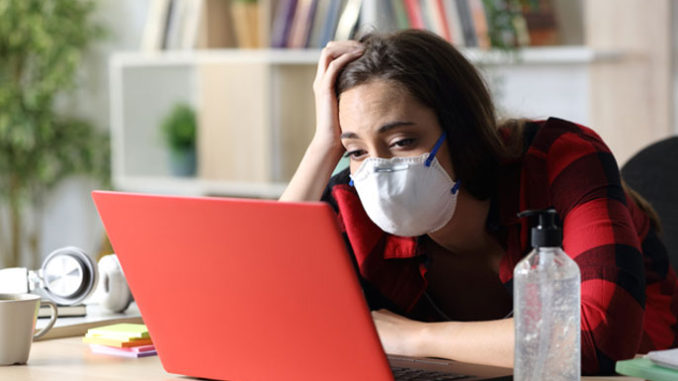
By ANA LISANIN
Since the start of the COVID-19 pandemic, college students’ mental health has suffered causing major stress and anxiety.
According to psychologists, mental health issues such as anxiety, depression, eating disorders and substance use are associated with lower GPA and a higher possibility of dropping out of college.
COVID has permanently affected the mental health and performance of college students.
— Cregory Dasean Nance ? (@thefly0ne) December 21, 2021
COVID-19 has permanently affected the mental health and performance of college students. Many students felt that since the pandemic, their stress levels have risen due to the overload amount of work they have received virtually and in person as well as feeling lonely throughout their college experience.
The most common ways that COVID-19 has impacted college student’s lives is through stress or anxiety. 91% of students deal with stress and anxiety and 81% of students deal with disappointment and sadness. Loneliness and isolation comes to a close third at 80%, according to University Business.
“Deciding what I want to do for the rest of my life, seeing classmates accomplish so much more than me, finding time for myself with such a hectic schedule, and attempting to become more sociable are all factors of stress since I started college,” said Izabela Hasandjekic, full-time student at Ramapo College of New Jersey.
As a college student throughout the COVID-19 pandemic, a majority of students have transitioned from all remote classes to back to school classes in just two years. These are drastic changes which have led to stressful routine changes.
College students mental health is a growing concern. According to the American Psychological Association, a survey finds that “Anxiety is the top presenting concern among college students (41.6 percent), followed by depression (36.4 percent) and relationship problems (35.8 percent).”
“I think professors need to understand that just because they’re loading more and more assignments, quizzes, and tests on students, it doesn’t mean that students are retaining this information especially in a remote environment,” said Era Berisha, a full-time student at John Jay College of Criminal Justice.
Coping with Stress
Still, with the amount of stress and anxiety that college students have faced, students have found ways to cope with stress and talk more about self care.
“Some ways I cope with stress is taking some time for myself. I find I am most stressed when surrounded by other people so doing activities such as reading, going on walks, painting, and gardening are my favorite ways of coping,” said Hasandjekic.
“I like to stay active such as go to dance class and the gym everyday which has made my anxiety tremendously better. Not only is dancing my stress relief, but it brings the best in me,” said Berisha.
College students need to sit back, take a break, get enough sleep, and stay connected with others, counselors say.
“We are social animals by nature, so we tend to function better when we’re in a community and being around others,” said Dr. Sawchuk, Mayo Clinic psychologist.
This story took learning about college students coping with mental health during the pandemic to a deeper level. The links that led to other sites made the experience more engaging and allowed me to learn more about certain aspects of the article. The quotes added new voices and perspectives that I also thought was helpful and engaging. I liked how the tweet wasn’t only a single tweet but instead had some replies to see what other people thought. It was really nice to hear what an actual student was saying and feeling about this topic. Great job!